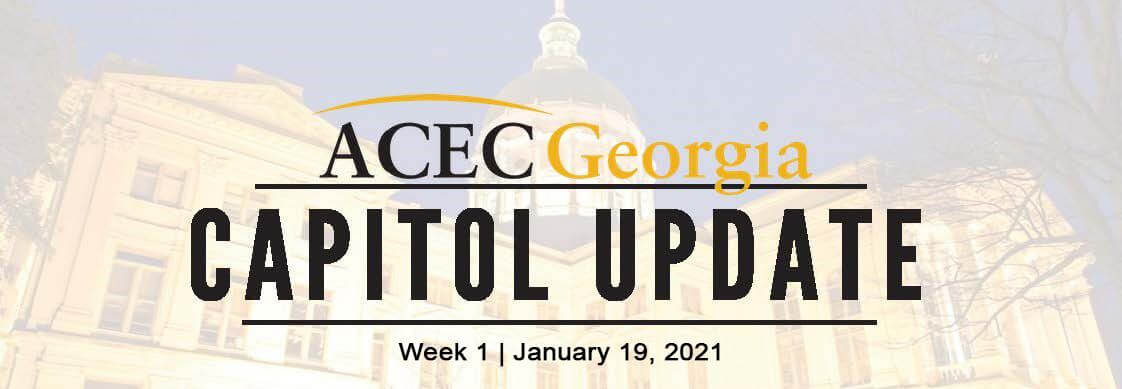Capitol Update: Week 1

The 2021 session of the Georgia General Assembly was gaveled in on Monday, January 11, 2021, beginning a new two-year legislative cycle that will also include a “once a decade” special session later this year to redraw all legislative and congressional districts based on the 2020 Census population figures.
This year’s session already looks unlike any other, with social distancing, masks, and bi-weekly surveillance COVID testing of members, staff and lobbyists. The current adjournment resolution only goes through Legislative Day 5, a nod to the uncertainty that lies ahead. On the very first Legislative Day, the Senate Majority Leader and others had already tested positive and there is an urgency building to at least quickly pass the Amended FY 2020 Budget in case the session must be halted yet again, as it was last March.
In addition to dealing with the impacts of COVID, the State Capitol grounds currently look like a military base, complete with National Guard members patrolling the grounds with long guns, as well as a few battering rams and other armored military vehicles surrounding the Capitol complex.
Despite these challenges, the General Assembly worked last week for Legislative Days 1 through 4, swore in 37 new members, heard the State of the State Address by Governor Brian Kemp, and prepared for this week’s upcoming Budget Week. Both Chambers held leadership elections and all Republican leaders were reelected in both chambers. The Democrats elected new leaders in both the House and the Senate, with Rep. James Beverly (D-Macon) becoming the new Minority Leader in the House and Sen. Gloria Butler (D-Stone Mountain) becoming the new Minority Leader in the Senate. The Senate Committee on Assignments announced new committee chairs and members, most notably, the Senate Transportation Committee will now be chaired by Sen. Frank Ginn (R-Danielsville). We expect Speaker of the House David Ralston will announce new House committee assignments and chairs this week. The House will have to name new Chairs for both the Ways and Means and Transportation committees, due to the previous chairs not returning to the House.
Budgets
On Thursday, January 14th, Governor Brian Kemp delivered his 2021 State of the State Address from the House Floor, promising no new budget cuts, no state employee furloughs and no tax increases. Governor Kemp also outlined his major policy priorities for the session: to provide a one-time $1,000 payment for public school educators and other employees; recommending an additional $647 million to restore funding to school systems across the state; $30 million to help ensure student connectivity for virtual learning; slashing testing requirements; allocating $19 million to support childcare for working parents; $20 million for this fiscal year and $10 million per year moving forward to boost access to rural broadband grants; and providing $40 million in his proposed budget to establish a Rural Innovation Fund.
Also, Governor Kemp released his $27.2 billion budget proposal for Fiscal Year 2022. A few of his budget proposals include $3.7 billion total funding for the Department of Transportation, with $1.7 billion dedicated to capital construction projects, $196 million for local maintenance and improvement grants, and $62 million for local road assistance administration. Transportation-related bond funding includes $100 million for what has become an annual allocation for new bridges across Georgia and $10 million for improvements to the state’s network of short-line railroads.
Here is the Governor’s Amended 2021 Budget
Here is the Governor’s 2022 Budget
ACEC Georgia’s Legislative Agenda
While it sometimes seems we spend most of our time killing bad legislation (an important task, no doubt), there are a few items that we intend to proactively move forward in this year’s legislative session. First, we will be proposing a joint House/Senate Study Committee to explore ways of expanding the use of Qualifications Based Selection (QBS) for procurement of design professionals at the local government level. We also plan to continue to work with our transportation industry partners in the Georgia Transportation Alliance on pursuing implementation of the recently released recommendations of the Georgia Freight & Logistics Commission.
QBS is, of course, already required for procurement of design services by state agencies and on any project (state or local) where federal dollars are involved. The ACEC Research Institute is currently funding an academic study in partnership with Georgia Tech and the University of Colorado that will examine the cost savings and other efficiencies that are realized by local governments from using QBS procurement. The intent of our study committee proposal would be to work with the Georgia Municipal Association (GMA) and Association of County Commissioners of Georgia (ACCG) to explore ways in which QBS could be expanded in a way that would not conflict with local governments’ concerns.
The Freight & Logistics Commission has worked diligently over the last two years to drill down to exactly what Georgia needs to successfully move our rapidly increasing freight traffic volumes throughout the state. After two years of testimony, the identified needs will require an additional $1.5 billion per year in new investments including rail, managed truck lanes, airport extensions, and other needed projects. Here is a copy of the final Freight & Logistics Commission report. ACEC Georgia will be working with the new House and Senate Transportation Committee chairs to find ways to begin to implement the Commission’s recommendations.
The Week Ahead
As previously mentioned, this week is Budget Week. The House and Senate Appropriations Committees will meet jointly to hear from state agency heads about their proposed budget requests. The next Legislative day will be next Tuesday, Legislative Day 5, on January 26, which is, at this point, also the last Legislative Day that the House and Senate have agreed on in the current Adjournment Resolution. Depending on how COVID surveillance testing of members, staff and the lobbying corps goes, we will see how much further into the 40 day legislative session we can make it this January.
